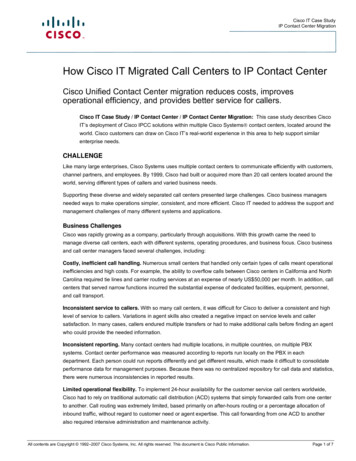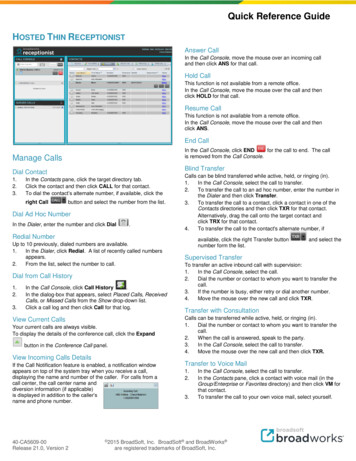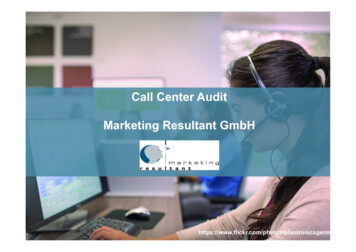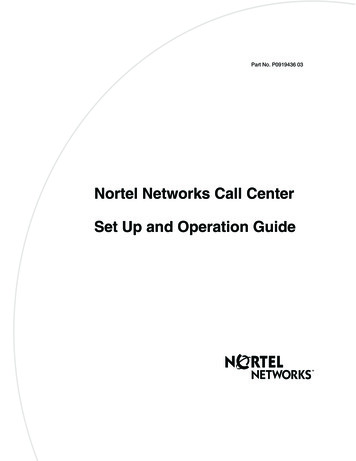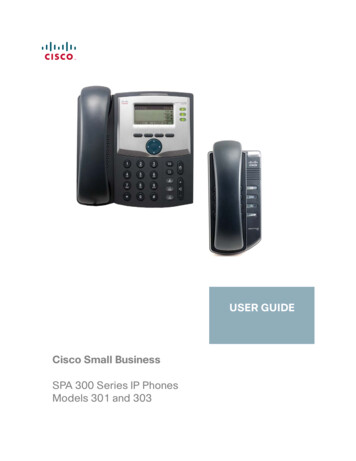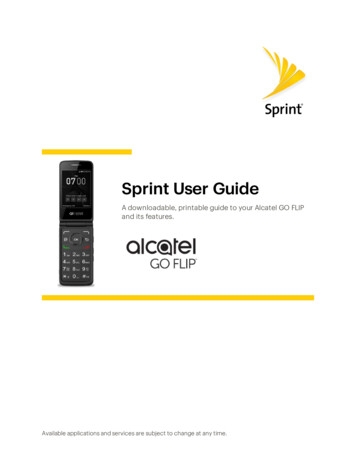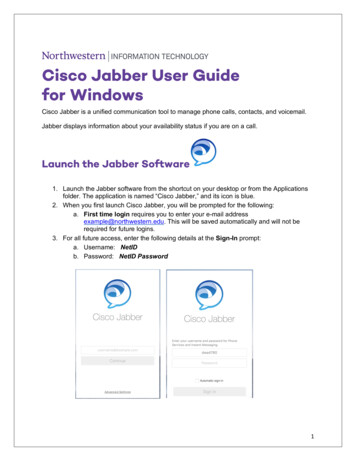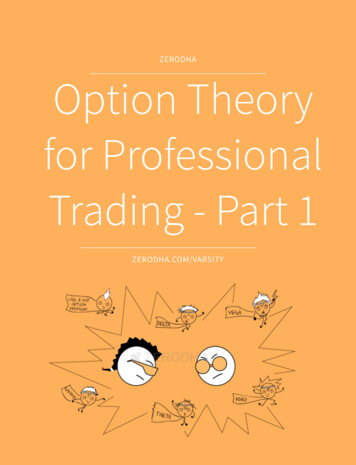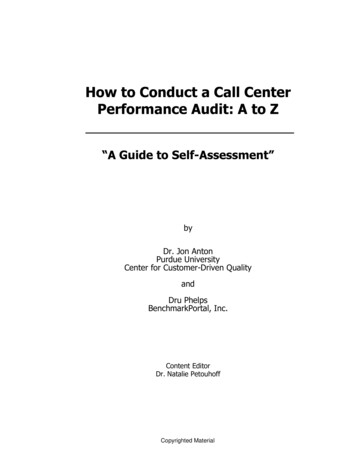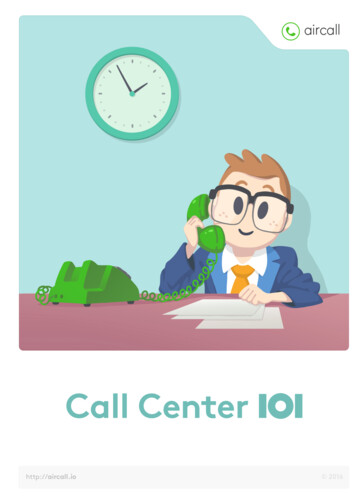
Transcription
Call Center 101Learn to manage a call center and focus onefficiency and productivity.
Table of contentsIntroduction4Hiring call center agents5How to prevent call center agent turnover1120 best-practices for call center agent training16Using scripts for agent productivity21Key Performance Indicators to keep an eye on27Boost call center excellence34
IntroductionCall Center 101 is intended for managers who want to understand how tomake a call center efficient and profitable.We will give you the keys to understand the different essential componentsof a successful call center: Hiring the best agents Leadership methods Tips to reduce agent attrition Training agents Scripts and improvisation Which key performance indicators to track Call center etiquette and best practicesOver the years call centers have evolved. Organizations often outsource theircustomer service or sales department for call centers. Yet, managing one'sown call center is actually more advantageous for businesses, since one canclosely monitor the quality of one’s customer service strategy.
Chapter OneHiring call center agentsIdentifying call center agent skills and warning signs.It is a well known fact that call centers are constantly looking for hires. Callcenter agents do not require specific qualifications to perform their job,therefore it's not easy to spot a good potential hire.In 2013 Deloitte conducted a survey about contact centers workforce. Theirfindings are not surprising: the primary concern of call centers is workforceavailability.Labor availabilityLabor costCustomer demandLabor qualityPolitical or natural disaster riskLanguage skillsProximity to headquartersRegulatory requirementsTax impactsLabor retentionTime zone considerations13 %10 %10 %9%7%0%20 %70 %47 %42 %35 %31 %25 %40 %60 %80 %100 %Hiring a call center agent that will excel at their job has never been easy.They are required to have a fitting personality, display relevant skills, and bemotivated.This sounds straightforward, but what happens when you have dozens ofcandidates who meet the criteria?
Core skills for call center agent excellenceWe have prepared a guide to help you spot an agent that stands out andthat would excel at their position. Let’s take a look at the core skills youshould look for in a call center agent.Adaptability and memoryThe agent’s job is to provide outstanding service to your customers. In orderto do that, they must be able to learn and remember everything about yourcompany and the services you are providing.Continuous training on the job will help them do that but the skills need tobe present in the first place.Ideally, even during the interview phase you should look for someone who isa hustler as well as a good listener.After training and practice, call center agents should be aware of everysingle detail about the services you are providing to your customers.An inviting voiceEven though physical appearance does not play any role for this position,there is a physical aspect you need to pay attention to – the voice.You’re not really looking for a golden, radio voice , but there are certaincriteria every candidate needs to fulfil in order to pass the interview.The impression they leave during the conversation with you should be one ofthe main deciding factors.EmpathyMany customer service calls are complaints, that's a given. A good agent willsolve the problem and ensure that the customer feels they’re being heard. A
call center is run by humans, and every customer should feel that they aretreated humanely.Attention to detailAfter hundreds of similar calls, one’s attention has the tendency to flag. It’sonly human. However an agent has to remain vigilant, because theunexpected call always comes in those moments when you’re caught offguard.Patience and calmOne of the most important skills for a call center agent! Unfortunately,customers that are complaining are not the nicest people in that givenmoment.Whether an agent is dealing with frustrated or irritated customers, an agentneeds to keep calm and their emotions under control.In these unpleasant situations, the agent will apologize for theinconvenience, do their best to solve the problem and ask if there is anythingelse that they can assist with.GratefulnessThe customer needs to be treated as someone responsible for the company’ssuccess. A simple “thank you” over and over again is required to make surethe customer feels that they matter to your business’s success.Autonomy and teamworkOn the one hand, an agent is taking one-on-one calls and needs to be ableto work independently, without being supervised or instructed. One the other
hand, a call center is a team of problem-solvers who need to work togetherto find a solution.If someone has an unpleasant voice, stutters or has trouble speaking, asunethical as it sounds, you simply cannot hire them as a call center agent.Efficiency75% of clients complain about the time they spend waiting for an agent topick up. Agents must be quick and work rapidly without compromising thequality their support.Here are three actions that need to be taken on a hierarchical level: setting up a database for client information planning callbacks when needed finding the right channel for better administrationOrganizationHiring an agent who has trouble being organized is a recipe for disaster.Customer service often requires a person to multitask between talking to aclient, accessing the database and taking notes.Sometimes you just can't know in advance if a person is organized or not,even if it seems that they are. A common practice here is to check with theirprevious employer if they have a track record of being an organized worker.This way you'll know without a doubt.CreativityNot every call will go according to plan. Sometimes, a call center agent willneed to find a solution that is acceptable for both sides, especially for thecustomer.
A satisfied customer will return or keep using your business's services. If theyhang-up on an agent, unhappy with their assistance, it is very unlikely thatthe client will remain loyal to your business.PersuasionA business has to remain profitable. Sometimes, an agent will not be able togive an offer a customer cannot refuse. However, a customer can think theygot what they wanted.Persuading a customer that the company and an agent have doneeverything in their power to meet their needs will result in a more satisfiedclientele.Look out for warning signsWhile finding the right skills and personality traits may be difficult, there aresome signs to help you filter the types of employees you don’t want to dealwith.As soon as you notice any of these warning signs in an applicant, thankthem and keep looking for a better candidate.Unwilling to learnAn agent needs to be trained. Not everyone has an experience working asupport job, and that’s okay. However, if someone doesn’t show thewillingness to learn and reach the desired standard, simply show them thedoor.ArgumentativeNo one likes employees that are short-tempered and get angered easily.Working one-on-one with an already mad and frustrated customer requires
calmness, not someone who will fuel the fire.Bad-mouths their previous employerWhatever happened at their previous job should be left behind. Gossipshould be left outside of the workplace. A potential hire who complainsabout their old boss is likely to repeat the same habits in the future.Lacks professionalismA potential hire should be able to hold a professional and polite conversationthroughout the duration of their interview. If they aren’t able to do so, don’texpect them to for eight hours a day. Your priority is not to parent a new hireit’s to give them the right tools that complement their existing skill set.Picking a perfect candidate to strengthen your call center is not an easytask. However, knowing what you’re looking for and what you want to avoidwill narrow the choice.Make sure that you do your part. Provide necessary tools, equipment, andmotivation for your employees, as well as occasional training. Don’t let yourteam down.
Chapter TwoHow to prevent call centeragent turnoverYour agents are your most valuable assetHigh turnover is a common problem that many call centers face. Attritionrate in the industry can often cause problems and may be as high as 20 or30% annually.The number one reason?Employees find it difficult to work with their manager or team leader.50 %Turnover rate37,5 %32 %24 %25 %16 %12,5 %0%10 %New hiresLowperformersMiddleperformersHighperformersIt might be surprising to learn that call center employees who find their workstimulating and rewarding still end up leaving their jobs.As a manager the worst case scenario is the one shown in the graph above.The graph shows that the best agents, are leaving, indicating that themanager or leader is not doing their job well.
How to retain your best agents?Here are the two most common ways:1. Promote them2. Improve your leadership and management.We'll examine the later, bear with us. Before we go deeper, let’s take a lookat three primary reasons why employees quit – and even better, what youcan do to avoid this recurring issue.Rules and guidelines are essentialManagers should always have their own set of rules. Employees, especiallywhen starting out, appreciate there being rules in place to guide them asthey learn the ropes. It helps them understand the structure of the system,and allows them know the boundaries within their positions and hopefullyhow to work within them.Managers need to acknowledge good workThe number one mistake managers commit is failing to acknowledge goodwork.Employees look to their managers and team leaders for guidance,inspiration, and praise. When they do a good job and you don’t let themknow that you appreciate it, it’s a crushing blow.Maslow’s Hierarchy of Needs cites esteem as the last tier needed for selfactualisation – if managers consistently fail to recognise their great work,what impulse do they have for doing it again in the future?When you think about it, it's only human. We all like to feel appreciated, andthis becomes essential when agents are putting great amounts of effort intotheir work - remember, it's a tough job to be a call center agent.
How to improve call center leadershipTrial and error is also part of human nature. While nobody is perfect it'simportant that you give an image of leadership so that agents look up toyou.Show your supportHow much time do you spend with your staff? The amount of time is crucialin helping new comers overcome the natural difficulties they will face whilegetting familiar with the job.Team managers are coaches and mentors but also need to bring operationalrigor to your organization.On average, a call center manager should spend: 2 hours /month doing side-by-side observations, 1 hour/month undertaking remote monitoring,
1 hour/month doing off-line coaching 1-to-1 reviewing with each team memberReward your agentsBeing recognized as doing a good job is as important for a competitiveperson’s self-esteem as meeting or beating a target. With that in mind,don't hesitate to take rewards exciting and immediate.There are a number ofinteresting alternatives to just offering cash. Depending on your staff’sinterests, it could be an Xbox, a meal at a restaurant, a pampering sessionat the health spa – anything really.Don't praise in excessToo much praise becomes meaningless, so only give it when it is trulywarranted. Try to acknowledge your agent in public as much as possible as itwill help their confidence and self-esteem.Coach them in private, so that they won’t feel humiliated in front ofeverybody.Trust your agentsPeople are much more productive when they are let off the leash a bit – thisshows that you have confidence in their abilities and it boosts their selfesteem, as long as what they do doesn’t hinder their deadlines or dailyquota.Be visibleIt is essential that your team see you in the office, whether you are justsupervising their work, or simply checking on them to see how they aredoing.
Being visible and available may also help in increasing your team’smotivation.Be consistent in your words and actionsMake sure you follow through and deliver on the tasks and commitmentsthat you made. Being inconsistent may be misconstrued as being someonewho is not trustworthy.These are just some of the most common issues that team leaders overlookwhen supervising a call center environment. Make sure you don't!
Chapter Three20 best-practices for callcenter agent trainingA trained agent is a happier agentManagers overseeing a call center know that their agents require regulartraining sessions, so that they can deliver exceptional customer service.Regular training is crucial for call center agents, whether it’s about any newlylaunched product or modifications in the existing product.Boosting agent productivity during trainingFrom taking orders to providing customer support, sticky situations arebound to arise. But how you handle these situations can mean the differencebetween creating loyal customers and losing business.Here are actionable training tips and best practices you can use startingtoday.Empower your agentsEmpower your agents to make decisions on behalf of the company is crucial.A highly trained agent with the power of decision will not only ensure highercustomer satisfaction, but will also enable single call resolution and thusresult in a more positive customer experience.It’s all about encouraging agent buy-in, not only into the value-driven servicetheir employer is providing, but also buy-in to the client brand that they arerepresenting.
Training should be varied and engagingTry and move away from monotonous training. If your agents aren’tengaged, they won’t learn. And your customers won’t benefit!Practice handling calls from the startHandling calls during the initial training session is an activity that can not beeliminated from the curriculum. It is imperative that the new hires receivepractice handling real-time calls.There is no substitute for this kind of experience. Role-play is good, but realcall handling is essential. Trainers should make sure that the equipmentworks and is available for each “real-time” call handling session. Operationsshould make this a priority.Create instant ‘shout outs’ based on great customerfeedbackRecognize great customer support in a public way. When your customersemail you about a great experience, you can announce it to the group, postit on an overhead call board monitor, and put it on the ‘shout out’ bulletinboard in your open space.Encourage upper management to participateIt’s really important that the upper management team takes the time eachweek to listen to calls and publicly praise the recognized agents with maybea certificate or gift card for example. This way, the agents will feelincentivised to do their best.Host monthly meetingsSchedule monthly calibration meetings with representatives from all of yourdifferent departments to review calls and tweak your methods or strategy inaccordance with common insights.
Make sure all feedback is clear and actionableIt’s crucial that you deliver feedback that agents can respond to. Make sureall feedback you give is clear and actionable. It is important to createopportunities for agents to discuss quality with their peers.Quality and best practice in the call center should not be driven solely bymanager-to-agent conversations.Lunch and learnStart lunchtime learning sessions where staff can elect to deliver a session ontheir topic of choice.Even if the topic isn’t work-specific, you’re giving your staff the opportunityto see a different side of their colleagues, and the person delivering thesession is able to share their energy and enthusiasm for something they’repassionate about. Great for upping the energy levels and engaging staff.Buddy-up your new starters with your best performersUse your best agents to support the training of new starters.Building relationships early with the top performers makes new agents wantto be like them.Offer incentives for achieving team goalsAnother call center customer service best practice is to offer incentives eachmonth to our agents who successfully meet their team goals.Use speech analytics to identify agent training opportunitiesBeing able to analyze large volumes of agent/customer interactions releasesinformation on specific calls with issues, and trends across the whole agentpopulation, creating the opportunity to coach staff using identified goodexamples to improve standards across the contact centre.
The resulting information not only creates training opportunities but alsoenables refinement of scripts, improving the overall performance of thecontact center.Align performance management with your wider strategyMake sure your whole approach to Performance Management is aligned to awider customer service strategy and employee engagement program.Your call center agents can then see the bigger picture and are more likely tobuy in.Create an agent workgroup to set targets and KPIsThis will help you set realistic and achievable targets that staff will buy into,as well as help change the perception of your senior management team asto the definition of high performers.Separate call accuracy from customer serviceBreak your quality measures down to address specific focus areas for agents.For example, split call accuracy from customer service, as someone could begreat at one but awful at the other.This will give you a greater ability to give agents praise where it’s due, butalso address any areas that are in need of development.Know your businessAll good business people understand that knowing your customers increasesyour ability to serve them, retain them and grow your base. Businessknowledge is power.The challenge facing contact center managers is how to gain knowledge ontheir customers, how they are being served by the company’s contactcentres and then how to use that information to further improve quality ofservice and revenues.
Work on improving knowledge management“Hone your skills to perfection and learn something new everyday”. This isbecause the only long-term competitive advantage for any organization isthe collective brainpower of its people.Build an open and transparent company cultureBeing open and transparent with your agents over time will build a culturewhere feedback and coaching is the norm – and fear will subside.Always make sure your agents identify with your valuesIn the training process, concentrate on how agents bond with thesupervisors and identify with your core values.If you identify someone who does not share your values during the trainingprocess, you may have to let the agent go right away.You can train for skills, but you can’t change values .Ask your agents for feedbackProvide your agents with feedback forms at the end of each training sessionto gain a wider understanding of how they feel the training session went –and also to see if, how and what you can improve.
Chapter FourUsing scripts for agentproductivityStructure your agents' discourseProductivity in the call center is the number one goal. The usual way ofenvisioning productivity is best results in the minimum amount of time. Inthis respect, scripts help agents a lot.However, lately scripts have acquired a bad rep. Customers generally don’tappreciate talking to somebody who sounds “robotic”.We want to show you how scripts can enhance call center productivity,streamline customer service and bolster confidence in employees. Whetheryour call center is sales-based cold calling or a customer service center,scripts can be considered a staple of the industry.69% of people preferunscripted customers support calls.What is a Script?In a call center, a script refers to prepared talking points and commonquestions referring to the calls coming in or going out.For sales, this can be information ensuring that each potential lead ismaximized, and customer service scripts allow customers to minimize theirfrustration and get the help they need as fast as possible.In theory, scripts cover the spectrum of customer needs, giving the agent ananswer for any question a customer can ask. To minimize searching,
fumbling, or asking a manager, the customer service script will make surethe agent has all of the answers in front of them.For cold calling, it will give the agent talking points to keep the lead on thephone and get the most information out of them. It can convince customersthat they need your product, even if they were apprehensive to start.The script will ensure that, even if the agent gets off of the phone without alead, they will have some useful information.How do Scripts Enhance Call Center Productivity?Call center scripts help productivity in multiple ways. Whether it is a salesscript or a support script, these tools are essential for getting the most outof your call center.Yet it is important not overlook the fact that prospects and clients do notlike talking to a machine. In a survey conducted by Hello Operator , most ofthe interviewees confessed that they prefer unscripted calls.How much does your experience of calling customer serviceimprove when the agent doesn’t soundlike they’re reading from a script?29 %22 %Improves slightlyImproves somewhatImproves a lotImproves tremendously16 %33 %Decrease training timeRelated to increased confidence, the more that is covered in a script, the lesstime another agent has to spend training a new agent.For the fresh faces who don’t know how to talk to customers over the phone,these scripts will serve as a game-plan on how to approach each phone call.
An effective sales or customer support script will cover most of the basicsthat a new agent needs to be aware of; decreasing the time it takes forthem to feel confident on the phone. This will also lower the amount of timethat a manager or another agent has to spend away from other valuablework.Avoid mistakesMistakes are generally unavoidable, but a good script can limit these errorsby ensuring that the talking points are always on the agent’s mind.Especially in reference to customer service, it is important that customersget the most out of a phone call in the least amount of time .An agent fumbling around, hitting the wrong keys and losing information willdecrease both customer service and call center productivity. A script will limitthese instances.Promote consistencyThe use of a script will give uniformity to the calls that take place in your callcenter. Especially in reference to customer service scripts, one of the mainbenefits is to promote consistency across the call center.When a customer calls in with an issue, you can be sure that each agent willhandle it the same way. This will decrease the amount of time spent on thephone with each customer, and ensure that all of the agents have thecorrect answers in front of them at all times.Retaining informationEspecially with regards to sales calling, recording the right information canbe the difference between a lead and a dead end. Scripts should have areasin which the agent can write pertinent information about the customer. Thiswill prevent agents from asking for something twice, and will remind themto gather information from the customer.
Best practices when using call center scriptsA script has to sound as natural and spontaneous as possible. Even if a scriptis written speech, letting your agents improvise is key!Scripts do enhance productivity when used correctly. Remember, nobodywants to feel like they are talking to a machine.Make it easy to skimOne of the purposes of a script in a call center is to streamline aconversation. This will translate into customer frustration and will inevitablybe counterproductive. It is important to use a different font and sometimeseven color-coding certain talking points. A script that is easy to maneuverwill enhance call center productivity.Learn the scriptCustomers want to speak with a person, not a robot. Human interaction isparamount in any call center. If a customer feels that an interaction is toostaged, they will become distant and unhappy. It is important that agentsknow the script and do not appear as though they are reading from a sheetof paper. This comes with practice, but it is important to put in the workbefore hitting the phones.Customize your scriptScripts are not a one-size-fits-all solution. Customers have different needsand unique circumstances. This must be taken into account when craftingscripts for your call center. Having a few different scripts on-hand will helpagents identify the best way to help a customer.Additionally, each agent has a different personality. This should also be takenwith a grain of salt, as something that Agent A says may seem unnatural orforced coming from Agent B. It is vital to know all of your staff and yourcustomer base.
Trust your agentsPresumably, you recruited your agents for their ability and expertise. They areon the front lines, and usually know what customers are looking for.It is important to consult agents when developing scripts for them to use. Ifthey feel that they haven’t been consulted, they are more likely to ditch thescript prematurely.Use real calls to create your scriptIn relation to the tip above, a good way to make sure a script is feasible is totake note from a real interaction. One of the calls with your best agent willgive the rest of the call center an example and something to work off of.It is important to know what real customers react to and what they areannoyed by.Don’t be afraid to change the scriptWriting an effective sales or support script takes a bit of trial and error toperfect. There is also a good amount of fluidity involved. Monitor trends infrequently asked questions and stopping points, and tailor your scriptsaccordingly.A script that worked six months ago may be obsolete, so it is important tochange it as your customer needs evolve.Let agents improviseMore important than any script, is that agents listen to the customer andreact appropriately. Scripts offer a solid foundation on which a conversationshould be based off of, but a call center script can only go so far.At some point, the agents needs to feel out the conversation for themselves.An amount of improvisation is required in this line of work, and agents thatonly work within the confines of a script will not be effective.
Using a script for your call center is something that a lot of managers arereluctant to do. There is a certain stigma attached to scripts in the industry,from both the agents and the customers themselves.They improve call center productivity and customer satisfaction, as well asdevelop a platform of informed conversation with the agent.Customer needs are always changing and one script may not be useful forall circumstances, but guidelines are incredibly helpful for an effective callcenter.Trust the agents you hired, and give them the best tools to succeed.
Chapter FiveKey Performance Indicators tokeep an eye onYou can't manage what you can't measureKnowing what and how to measure is particularly true in the call center,where key performance indicators are a prerequisite for effective decisionmaking. Yet few call centers use key performance indicators, or KPIs, to theirfull potential.In short, performance measurement and management are critical disciplinesthat must be acquired for any call center that aspires to world- classperformance.Only five metrics are fully relevant to track performance in the call center.These KPIs represent the 80/20 rule: 80% of the value you receive fromperformance measurement and management in your call center can bederived from these 20% simple metrics. Cost per call Customer Satisfaction First Call Resolution Agent Utilization Aggregate Call Center PerformanceCall center metrics that don’t matter (as much)There is a common misunderstanding that if Average Speed of Answer andCall Abandonment Rate are low, than performance increases automatically.Yet, this assumption proves to be wrong. This is what happens as explainedby Eric Zbikowski in MetricNet’s expert.
"These facts fly in the face of almost all call centerwisdom, which holds that ASA and Call AbandonmentRate should be driven as low as possible.The reality is that these measures can yield unintendedresults if pushed too low. They will increase your costswithout any corresponding increase in customersatisfaction."Most call centers commit two major mistakes when it comes toperformance measurement:1) they track too many metrics2) they do not exploit the full potential of their performance metrics as adiagnostic tool.The KPIs to measure for successThe two “foundation metrics” that every call center should track on anongoing basis are cost per call and customer satisfaction.The next two metrics in the top five are the ones that have the greatestinfluence on cost and customer satisfaction: agent utilization and firstcontact resolution.Finally, the last metric, what Eric Zbikowski calls an "aggregate metric"because it provides an overall measure of call center performance, is thebalanced score.These five metrics not only allow you to effectively measure your call centerperformance, but they enable you to: Identify strengths and weaknesses in the call center Understand anddiagnose the performance gaps ƒtriggers Advise actions to improveperformance
Track and trend performance over time Benchmark performance vs. industry peers Set up performance goals for both individuals, and the call centeroverallThese are the metrics we'll be examining here as they are at the foundationof cost and productivity.Cost per Call correlated with Agent UtilizationIt is common knowledge that agents represent the single biggest expense inthe call center. In fact, for the average call center, 67% of all costs are laborrelated: salaries, benefits, incentive pay, and contractors.Breakdown of average call center expensesAgents and supervisor
Call center etiquette and best practices Over the years call centers have evolved. Organizations often outsource their customer service or sales department for call centers. Yet, managing one's own call center is actually more advantageous for businesses, since one can closel

